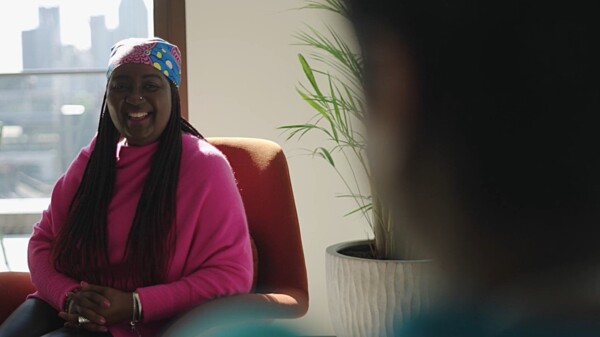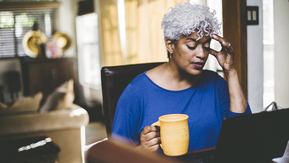
Neurodiversity and cancer: getting information and support
Living with cancer and neurodiversity can make some aspects of managing diagnosis and treatment challenging.
There is support available for people with cancer. Your healthcare team can give you information. They can answer your questions and you can tell them if you are worried about anything so they can help.
What is neurodiversity?
When you are neurodivergent and living with cancer, it can be hard to get the support you need. This article will help you to find the right help and information.
Neurodivergent people may think, move, process information, or communicate in different ways to those who are described as neurotypical. At least 15% of the population are neurodivergent. Types of neurodiversity include:
- Attention Deficit Hyperactivity Disorder (ADHD)
- Autism
- Dyscalculia
- Dyslexia
What should I do if I can't understand the information I've been given?
When you are first diagnosed with cancer you are given lots of information. This might be information you are told on the phone or in person. You might be given booklets to read. It can be hard to understand and remember everything.
You can ask for the information in a different way if you would find that better. Understanding is important, so ask questions as you need. Read our support to understand information.
You do not need to use medical words. Use the words you usually say. Your healthcare team want to know your worries. They can then give you the right help and support.
We provide a range of support services for people living with cancer.
- You can call the Macmillan Support Line for free on 0808 808 00 00, open 7 days a week 8am to 8pm.
- Visit our Online Community forums to connect with others who know what you or your loved one are going through.
- We have audiobooks and easy read versions of our booklets which use simple language and pictures to tell you about cancer.
- Having written resources to take home can make it easier to understand and process complex medical information. All our cancer information is written and reviewed by our team of cancer experts. Find out more about how we produce our information.
"I find waiting rooms hard because of noise, movement and lights. My healthcare team were happy for me to sit somewhere else or use headphones." Helen
What can I do if I need more information and support?
If you feel you can, tell your healthcare team about your neurodiversity. It can help them better support you. They can give you information and support in a way that meets your needs.
You may want information ahead of appointments so you can be prepared. You may want to get information in different ways.
There is training for healthcare professionals about neurodiversity, especially autism. The Curly Hair Project and other organisations offer this. Training can help professionals understand the needs of neurodiverse people.
Hospitals have a patient support service, such as PALS (Patient Liaison Service). This service can help support you while you are having hospital care and treatment. They can help you understand what is going on. They can also get your views or wishes heard.
The patient support team might be able to arrange for you to see a hospital department when it is quiet. They may be able to explain what will happen, and show you the medical equipment. This can help you prepare for an appointment.
- PALS (Patient Advice and Liaison Service)
- PASS (Patient Advice and Support Scotland)
- Northern Ireland Patient Council
Further resources
Can I bring someone to my appointments?
Bringing someone to your appointment is usually OK. If someone tells you not to, you can ask why and what other support you will receive.
Having someone with you can help you remember what was said. They can take notes. They can help you remember any questions you might have.
Tell your healthcare team about things that help so they can arrange this. You might prefer to wait in a quiet area. You might want to be away from phones or loud equipment. You might prefer to stand or sit during meetings.
Sunflower lanyards
The sunflower lanyard scheme aims to help people with non-visible disabilities get support in public places. Some people have medical conditions or disabilities that are not easy to see.
They may wear a green lanyard, wristband, or badge. This badge has a sunflower design. This shows they have a hidden condition and may need extra support.The sunflower lanyard scheme aims to help people with non-visible disabilities get support in public places.
Sunflower lanyards are not recognised everywhere. But many UK organisations, shops and travel companies now understand what the lanyard means. You may find it helpful if you need extra support while you are travelling in the UK.
Some organisations provide sunflower lanyards for free. Or you can buy them from hiddendisabilitiesstore.com
I need help with how I am feeling, where can I get help?
There is no right or wrong way to feel. Having different emotions is common when you are neurodivergent and living with cancer.
Remember, everyone's experience is unique. Try to be patient with yourself. There is help available if you are struggling.
You may find the idea of talking about cancer upsetting or uncomfortable. But talking to someone about how you feel can help you cope with your emotions, feel more in control and less alone. Things you can try include:
- Be open with your healthcare team, they can help provide information about available support.
- Call the Macmillan Support Line for free on 0808 808 00 00, 8am to 8pm, 7 days a week. Advisers can provide emotional support and practical information.
- Seek out support networks or communities specifically for neurodivergent people living with cancer. Connecting with others who share similar experiences can give emotional support and practical advice. Use our Online Community forums to talk to others with lived experience of cancer.
- Focus on your wellbeing and what coping strategies work best for you.
Further resources
5 takeaway practical tips
- To help you manage day to day, focus on what coping strategies work best for you.
- Take someone with you to appointments, if you can.
- Be open with your healthcare team about what helps you and ask questions.
- Get more support. You can visit our Online Community forums to connect with others. You can also access our audiobooks and easy read versions of our booklets. These booklets use simple language and pictures to tell you about cancer.
- If you need more information, call the Macmillan Support Line for free on 0808 808 00 00. You can also chat online or email us.
Other organisations who can help
About our information
This information has been written, revised and edited by Macmillan's Digital Content Editor team and checked by Macmillan's Cancer Information Development team.
Learn more about our Digital Content Editors and how we produce our cancer information.
About the author

Ros Ayres
Read more
-
Blogs 25 Jul 2025If you are thinking of contacting the Macmillan Support Line but aren’t quite sure what to expect, this guide will explain what happens so you can feel more comfortable getting in touch.
-
Blogs 21 Oct 2025How Macmillan Cancer Support, Roche, and the NHS Race and Health Observatory (NHSRHO) are working together to address ethnic inequalities in clinical trials for breast cancer.
-
Blogs 22 Oct 2025Hot flushes are a side effect of some cancer treatments that can be difficult to cope with. We’ll explain why they happen, what you can do, and where to find support.






